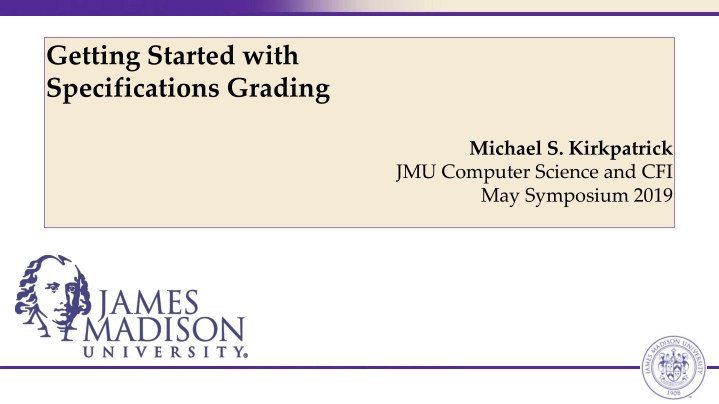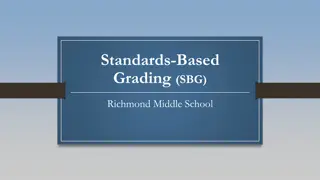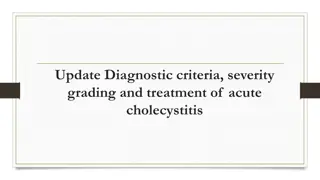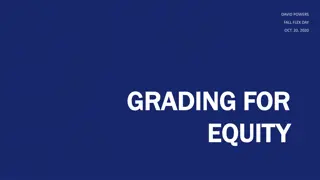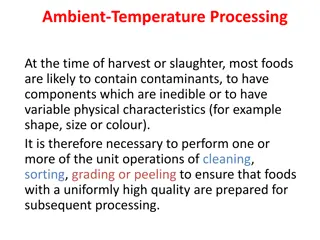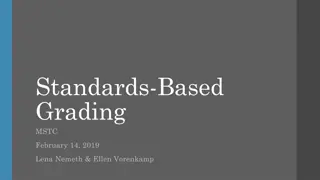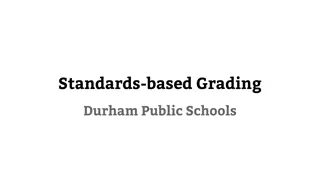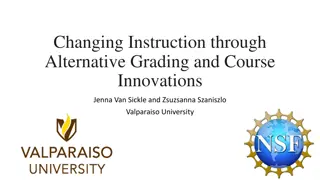Getting Started with Specifications Grading in Computer Science
Dr. Michael S. Kirkpatrick from JMU presents a detailed grading scheme involving readiness tests, project deadlines, reflections, team projects, and exams in his symposium on specifications grading. The importance of grading and its impact on learning outcomes are discussed, along with insights on empathy, interpretation, and cultivating professionalism in computing students.
Uploaded on Nov 15, 2024 | 0 Views
Download Presentation

Please find below an Image/Link to download the presentation.
The content on the website is provided AS IS for your information and personal use only. It may not be sold, licensed, or shared on other websites without obtaining consent from the author.If you encounter any issues during the download, it is possible that the publisher has removed the file from their server.
You are allowed to download the files provided on this website for personal or commercial use, subject to the condition that they are used lawfully. All files are the property of their respective owners.
The content on the website is provided AS IS for your information and personal use only. It may not be sold, licensed, or shared on other websites without obtaining consent from the author.
E N D
Presentation Transcript
Getting Started with Specifications Grading Michael S. Kirkpatrick JMU Computer Science and CFI May Symposium 2019
A traditional scheme iRAT/tRAT are readiness tests taken first day of each module Weight 10% iRAT Each project has specific deadline (10% penalty for up to 48 hours late) 10% tRAT 5% Reflections 35% Team projects Make-up exams only for documented excused absence 15% Midterm exam 25% Final exam Getting Started with Specifications Grading May Symposium 2019 Dr. Michael S. Kirkpatrick
Barre, E. (2016) Meaningful, moral, and manageable? The grading holy grail. https://cte.rice.edu/blogarchive/2016/2/9/grading Getting Started with Specifications Grading May Symposium 2019 Dr. Michael S. Kirkpatrick
Why grade? [We have to ] Fun? Learning? Predictor of success? Motivation? Barre, E. (2016) Meaningful, moral, and manageable? The grading holy grail . https://cte.rice.edu/blogarchive/2016/2/9/grading Getting Started with Specifications Grading May Symposium 2019 Dr. Michael S. Kirkpatrick
Credit: Dr. Kenn Barron, JMU Motivation Research Institute Getting Started with Specifications Grading May Symposium 2019 Dr. Michael S. Kirkpatrick
Credit: Dr. Kenn Barron, JMU Motivation Research Institute Getting Started with Specifications Grading May Symposium 2019 Dr. Michael S. Kirkpatrick
Learning outcomes Empathy Interpretation Getting Started with Specifications Grading May Symposium 2019 Dr. Michael S. Kirkpatrick
Learning outcomes Build safe and efficient concurrent software systems Cultivate a sense of identity as a computing professional Evaluate the root cause of complex system failures Articulate the tradeoffs induced by design choices Getting Started with Specifications Grading May Symposium 2019 Dr. Michael S. Kirkpatrick
Specifications Grading Specifications One-level pass/fail rubrics Getting Started with Specifications Grading May Symposium 2019 Dr. Michael S. Kirkpatrick
Specifications Grading Specifications One-level pass/fail rubrics Feedback Early and formative Getting Started with Specifications Grading May Symposium 2019 Dr. Michael S. Kirkpatrick
Specifications Grading Specifications One-level pass/fail rubrics Feedback Early and formative Bundles Grouping of tasks or assignments Getting Started with Specifications Grading May Symposium 2019 Dr. Michael S. Kirkpatrick
Specifications Grading Specifications One-level pass/fail rubrics Feedback Early and formative Bundles Grouping of tasks or assignments Tokens [Optional] Drops, resubmits, late days, etc. Getting Started with Specifications Grading May Symposium 2019 Dr. Michael S. Kirkpatrick
Point-based specs grading Reading quizzes + homeworks worth 1 point each Weight 17 Reading Written assignments (analysis, reports) worth 10 points each 40 Written assignments 8 Self-regulated learning Self-regulated/metacognitive learning activities (exam corrections, muddy points) worth 2 points each 10 Creative project 10 Midterm exam Creative project can be individual or group 15 Final exam Getting Started with Specifications Grading May Symposium 2019 Dr. Michael S. Kirkpatrick
Credit: Dr. Kenn Barron, JMU Motivation Research Institute Getting Started with Specifications Grading May Symposium 2019 Dr. Michael S. Kirkpatrick
Horizontal bundling Bundle 1 Bundle 2 Bundle 3 Bundle 4 Bundle 5 Reading analyses Homework problems Annotated bibliography Project live demo Analysis paper 2 bundles = D 3 bundles = C 4 bundles = B 5 bundles = A Getting Started with Specifications Grading May Symposium 2019 Dr. Michael S. Kirkpatrick
Hierarchical bundling All B requirements plus Project analysis paper Solve 6 total final exam problems A All C requirements plus Project implementation and working demo Solve 4 total final exam problems B All D requirements plus Complete 4 of the 5 lab exercises Solve 3 total final exam problems C Complete 3 of the 5 lab exercises Have no more than 5 unexcused absences Solve 2 total final exam problems D Getting Started with Specifications Grading May Symposium 2019 Dr. Michael S. Kirkpatrick
Some cautions Not advised Address challenges Go ahead 50 30-49 < 30 Number of students unprepared variable/unknown prepared & motivated Student preparedness Getting Started with Specifications Grading May Symposium 2019 Dr. Michael S. Kirkpatrick
Some cautions Not advised Address challenges Go ahead 50 30-49 < 30 Number of students unprepared variable/unknown prepared & motivated Student preparedness 0-3 years 3-5 years 5+ years Teaching experience low familiarity moderate to high content expert Content expertise contingent or late pre- tenure early pre-tenure tenured Status or rank Experience with evidence-based pedagogy none some extensive no somewhat yes Learner-centered Getting Started with Specifications Grading May Symposium 2019 Dr. Michael S. Kirkpatrick
Some cautions Not advised Address challenges Go ahead yes, with pre-set, inflexible components yes, with only some constraints no; yes but instructor has freedom Required course yes, and integration is fixed yes, with limited coordination no; yes, but coordination not required Part of sequence yes, and consistency is required yes, with only partial coordination no Coordinated sections yes, norm-referenced (curving) no, but grade inflation is a concern no Dept requirements Getting Started with Specifications Grading May Symposium 2019 Dr. Michael S. Kirkpatrick
Case study Getting Started with Specifications Grading May Symposium 2019 Dr. Michael S. Kirkpatrick
Case study Identify potential problems in the instructor s spec grading scheme. Consider... alignment of objectives with assessments, including specs opportunities students have for feedback and revision opportunities students have for choice emphasis and balance among the bundles Getting Started with Specifications Grading May Symposium 2019 Dr. Michael S. Kirkpatrick
Fix it Getting Started with Specifications Grading May Symposium 2019 Dr. Michael S. Kirkpatrick
Your turn Identify a core learning objective for a course you have recently taught. Create a specification for an assessment. Consider what type of assessment is needed what criteria define B-level quality what forms of scaffolding you must provide how easily/quickly can you provide feedback Getting Started with Specifications Grading May Symposium 2019 Dr. Michael S. Kirkpatrick
Discussion Getting Started with Specifications Grading May Symposium 2019 Dr. Michael S. Kirkpatrick
Resources https://www.cmich.edu/office_provost/AcademicAffairs/CAA/Ass essment/Documents/2nd%20Annual%20Assessment%20Retreat/ Kevin%20Cunningham.pdf https://www.insidehighered.com/views/2016/01/19/new-ways- grade-more-effectively-essay https://justtv.wordpress.com/2016/02/16/rethinking-grading-an- in-progress-experiment/ https://rtalbert.org/specs-grading-iteration-winner/ Getting Started with Specifications Grading May Symposium 2019 Dr. Michael S. Kirkpatrick
